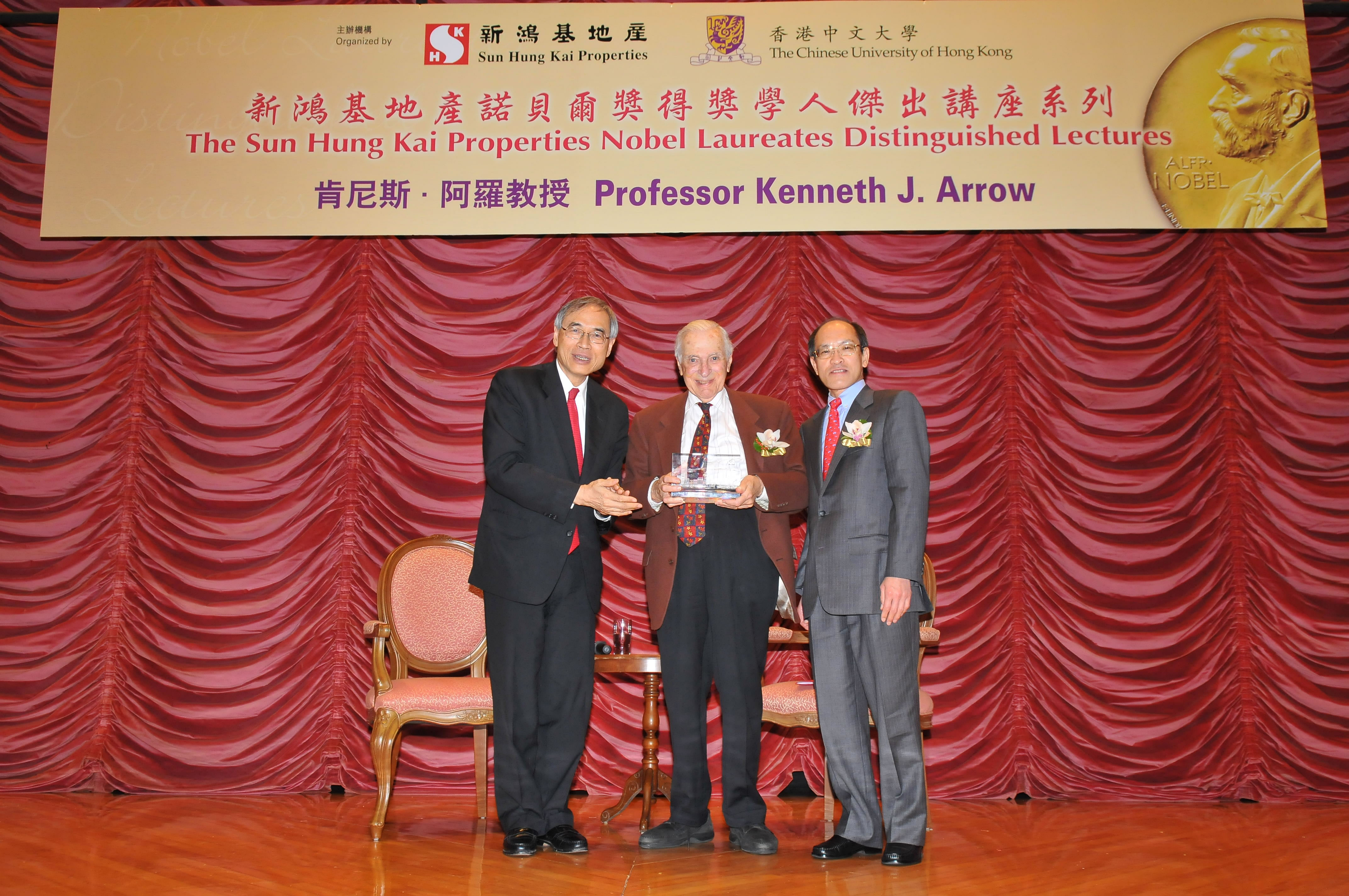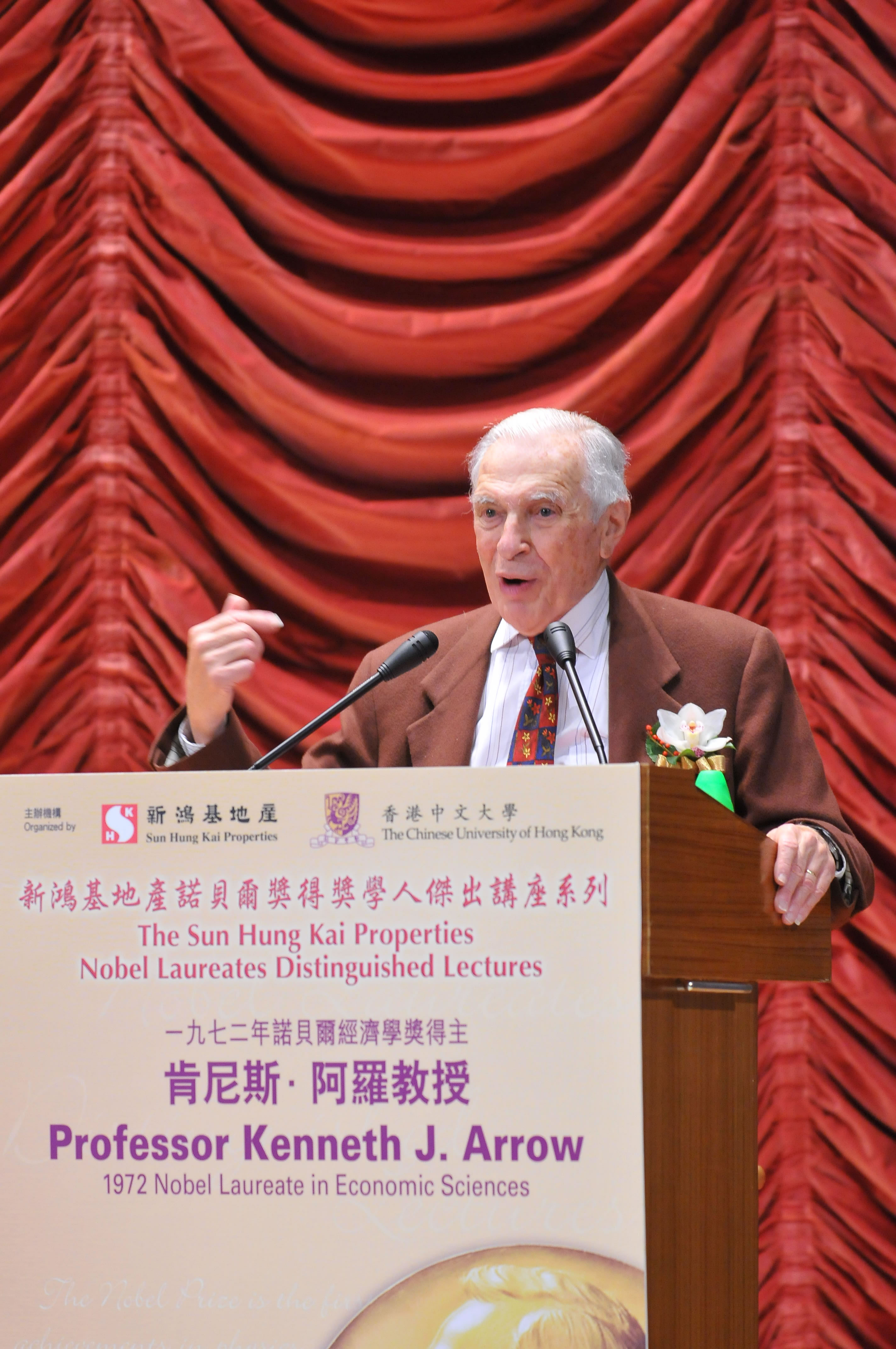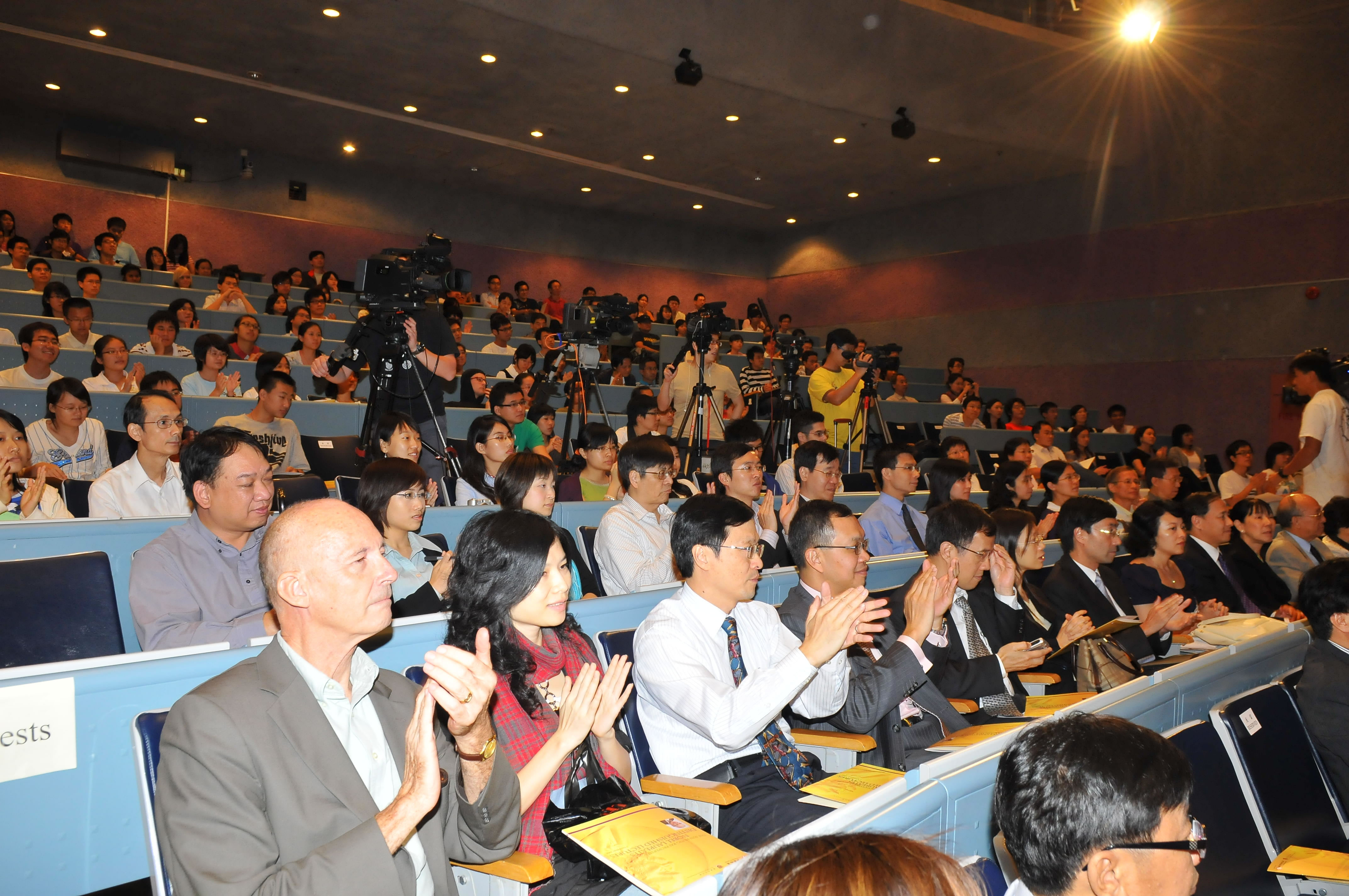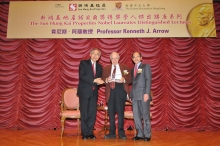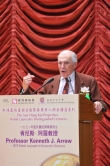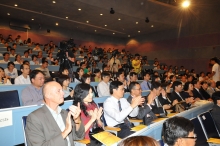CUHK
News Centre
Nobel Economist on Economic Analysis and Social Obligation Under Auspices of SHKP and CUHK
To celebrate the fifth year of the Sun Hung Kai Properties Nobel Laureates Distinguished Lectures, Sun Hung Kai Properties (SHKP) and The Chinese University of Hong Kong (CUHK) announced earlier that three Nobel Laureates in Economic Sciences have been invited to deliver three lectures to address the current state of the global economy. Unveiling the new economic lecture series, the first lecture was delivered today (3 November) by Professor Kenneth J. Arrow, 1972 Nobel Laureate in Economic Sciences, who spoke on “Economic Analysis and Social Obligation” to an audience of around 500 CUHK staff, students, alumni and members of the economic and political sectors, as well as the general public.
SHKP Executive Director Michael Wong said, “We started the Nobel lecture series with The Chinese University of Hong Kong in 2004 and it is now in its fifth year. The lectures are major events in Hong Kong, as the public and local scholars look forward to them for academic inspiration. Hong Kong is facing challenges posed by the global financial tsunami, but we hope that our lectures will produce valuable insights for people. We also hope that the lectures will interest young people, give them new perspectives and encourage them in their studies.”
CUHK Vice-Chancellor Professor Lawrence J. Lau thanked SHKP and its Vice Chairman and Managing Director Dr Raymond Kwok for their unwavering support over the last five years. He added, “Professor Arrow is one of the most listened to of all practising economists in the last half century. The impact of his scholarly work has been tremendous. Four of his students have been awarded the Nobel Memorial Prize in Economic Sciences: John Harsanyi, A. Michael Spence, Eric Maskin, and Roger Myerson. I would like to express our utmost gratitude to Professor Arrow for coming all the way to visit The Chinese University and share with us his wisdom and scholarly insights.”
In the lecture, Professor Arrow discussed a major question of government policy and one of the most important issues facing the world in 2008 – the extent to which the government should intervene in the workings of markets. There is a general theoretical proposition, which also conforms to empirical experience, that, under competitive conditions, market outcomes are efficient in a certain precise sense. It follows that the government should intervene when markets fail to operate properly, that is, when individuals benefit or impose costs on each other in ways that are not mediated through the market (e.g., pollution). An additional reason for government intervention, not as widely accepted, is to make the income distribution more equal than the market outcome. But in that case the redistribution should interfere with consumers’ choice as little as possible, which means that the redistribution should take the form of money transfers (taxes and payments).
Economists typically argue, then, that externalities be recognized by taxes which are a kind of substitute for prices and redistribution by money payments.
In fact, though, there are all sorts of felt social obligations that are not encompassed by this simple proposition. First of all, there are the obligations of parents to children (the obligations of children to parents are fading), which have long been recognized in law. Second, there are the collective obligations of the present generation to the indefinite future, displayed historically by wars in defence of a country and by constitutions and other legislation and faced currently in concerns about exhaustible resources and climate change. Third, he pointed out that, by now, most government expenditures even in the United States are for education, retirement, and health, goods which have very few externalities as currently understood.
Professor Arrow is a professor at Stanford University. Together with John R. Hicks, he was awarded the Nobel Prize in Economic Sciences in 1972 “for their pioneering contributions to general economic equilibrium theory and welfare theory”. He has published work on a variety of topics in economics, including work on social choice, the use of securities for risk-bearing, general equilibrium theory, the economics of information, with special reference to asymmetric information, inventories, economic growth and its measurement, medical economics, and the economics of innovation. He has also received a number of honours, including the John Bates Clark medal of the American Economic Association, and the John von Neumann Theory Prize of the Institute for Operations Research and Management Science, as well as 25 honorary degrees.
The lecture was broadcast live to local universities, and the Hong Kong Science and Technology Parks with the aim of extending its benefits and raising public awareness of the leading scholarship in the six Nobel prize categories: Physics, Chemistry, Physiology or Medicine, Literature, Peace and Economic Sciences. It was also available on the Hong Kong Education City web site for online viewing by secondary school students and teachers. There was also a live feed to Peking, Fudan, Shanghai Jiao Tong, Tsinghua, Zhejiang, Nanjing and Sun Yat-sen Universities on the mainland.
With economic issues taking centre stage in world affairs recently, the remaining two lectures by Professor William F. Sharpe, 1990 Nobel Laureate in Economic Sciences, and Professor Douglass C. North, 1993 Nobel Laureate in Economic Sciences, will be held respectively on 29 November, at the Grand Ballroom, Grand Hyatt Hong Kong, and 11 December at the Lecture Theatre, William MW Mong Engineering Building, CUHK. Professor Sharpe will lecture on “Financing Retirement: Collective and Individual Approaches”, while Professor North will talk about “The Dynamics of Societal Change: A New Approach”. A limited number of free tickets will be set aside for the public and details of distribution will be announced soon.
The Sun Hung Kai Properties Nobel Laureates Distinguished Lectures were inaugurated in 2004 in conjunction with The Chinese University of Hong Kong. The series brings in Nobel Laureates to speak to a broad cross-section of the community, to promote the discovery and the dissemination of knowledge, professional and entrepreneurial expertise and contributions to humanity. Including this, the fourteenth installment of the series, 21 Nobel Laureates or renowned scholars had lectured in Hong Kong.
SHKP Executive Director Michael Wong (right) and CUHK Vice-Chancellor Professor Lawrence J. Lau (left) present a souvenir to Professor Kenneth J. Arrow, 1972 Nobel Laureate in Economic Sciences


